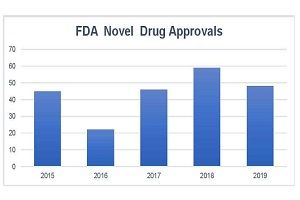FDA approved 48 ‘novel’ drugs in 2019, down 19% from prior year
Of NDA/BLA drugs, 45% require cold-chain distribution
Just after New Year’s, FDA published its annual list of “novel” drugs, which include New Drug Applications (NDAs), some Biologic License Applications (BLAs) and some incidental categories, totaling 48 (see Table). While down somewhat from 2018’s total of 59, the level of activity is still well above the 10-year average of 36. Many factors can be cited for the heightened activity, starting with the generally favorable environment for drug research (especially for rare diseases) and including the variety of expedited methods FDA employs to accelerate drug reviews.

The CDER report that details these novel drugs notes that 29 of the 48 drugs (60%) had one or more of the expedited review categories (Fast Track, Breakthrough, Priority Review, and/or Accelerated Approval). Twenty-one (35.6%) of them received orphan-drug designation (which gives some added benefits to the drug developer). And, partly to toot its own horn, CDER notes that 33 of the novel drugs (69%) received first approval globally in the US.
Cold chain trend
Using slightly different criteria (including, for example, biosimilars, which are not on the “novel” list), Pharmaceutical Commerce counts 60 new drugs approved in 2019 (38 NDAs and 22 BLAs). Of those 60, 27, or 45%, require temperature control (usually 2-8°C) during storage and shipment. One drug in the new cellular and genetic therapy (CGT) category was approved: AveXis’ Zolgensma, which requires shipment at -60°C or below, and storage at 2-8°C.
The 10 biosimilars approved (all of which require refrigeration) brings the total to 26 of approved biosimilars in the US. And while some of the 26 are for the same reference drug (such as Humira and Herceptin, each of which has five approved biosimilars), only some of any of the approved biosimilars are on the market in the US.